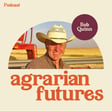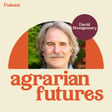
Rex Weyler on "Solving" Climate Change and Living Simply
“I believe there is something dangerous about our entire notion of what a solution to climate change even is. We’re trying to engineer our way out of an ecological crisis that we engineered ourselves into. Growing bigger and more complex might not help. We’re going to have to humble ourselves first.”
In this episode, we were joined by the one and only Rex Weyler - activist, author, co-founder of Greenpeace, and a veteran of the ecology movement - to examine why the early momentum for ecological change slowed and how our obsession with controlling nature has led us astray. He offers a compelling critique of our collective fixation on technological fixes, arguing that it blinds us to a deeper truth: we’re part of nature, not separate from it.
Rex challenges us to rethink what living sustainably truly means and to question the myths of “green technology” and perpetual growth that define our modern world. Instead, he advocates for a life rooted in simplicity and intentional choices, where individual and community well-being align with the rhythms of the natural world. Join us as we explore Rex’s vision for a society that is rooted in an ecological lens, and learn how living simply might be the most radical—and effective—path forward.
In this episode, we cover:
- How Rex’s childhood in wild places shaped his appreciation for the natural world.
- The radical origins of Greenpeace and the famous intervention that launched “Save the Whales”
- An exploration of why the environmental movement has been - in Rex’s words - “mostly a failure.”
- Why Rex believes we lost an important concept in transitioning from an “ecological” movement to an “environmental” movement
- How our fixation on growth undermines efforts to halt climate change.
- Positive examples of communities living in harmony with nature
- The joy and restorative power of living simply
- And much more...
More about Rex:
Rex Weyler is a writer and ecologist. His books include Blood of the Land, a history of indigenous American nations, nominated for a Pulitzer Prize; Greenpeace: The Inside Story, an account of the first decade of the Greenpeace organization and a finalist for the Shaughnessy-Cohen Award for Political Writing; and The Jesus Sayings, a deconstruction of first century history and finalist for the BC Book Award. In the 1970s, Weyler was a cofounder of Greenpeace International and editor of the Greenpeace Chronicles, the organization's newsletter. In the 1980s, he founded the Hollyhock Learning Centre in BC, Canada. He currently works with the International Bateson Institute as an ecology researcher and teacher. He lives on Cortes Island in British Columbia, Canada.
Agrarian Futures is produced by Alexandre Miller, who also wrote our theme song. This episode was edited by Keith J. Nelson.



















